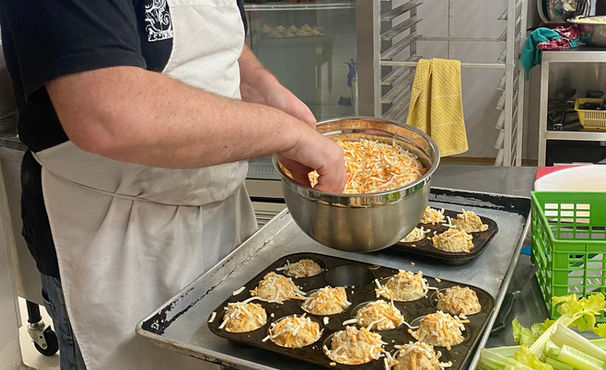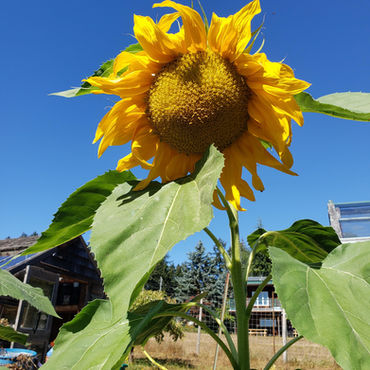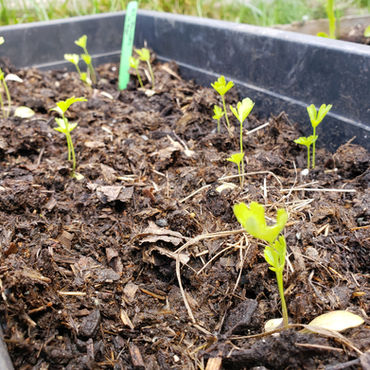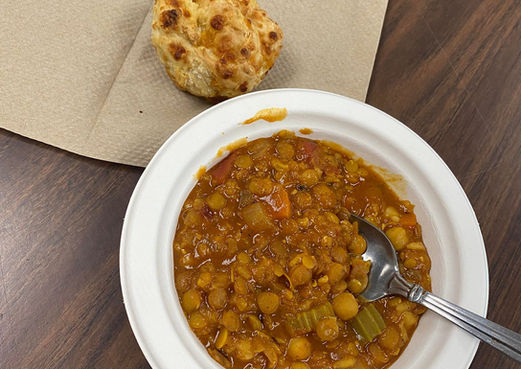Grocery Programs (Food Bank)
What is food insecurity? It’s many things. It’s parents who skip a meal once a week so their kids can eat. It’s also people who have to choose between buying groceries or paying their rent on time. It’s anyone who doesn’t know how they’ll get their next meal—and that number is growing.
We have seen an increase of use at People for a Healthy Community - Grocery Program (food bank) on average of one new person per week using the program. So if you’re asking if grocery programs are really necessary, the answer is yes—more than ever.
With the rising unaffordability and income inequality Grocery Programs are needed more than ever.

When is the Grocery Program available?
The Grocery pick-up is available at People for a Healthy Community (PHC) office on:
Tuesdays - 10am - 2pm
Wednesdays - 11am - 4pm
Thursday - 3pm - 7pm
Where does our food come from?
PHC gets provisions from a lot of different places. In some cases, they may purchase some of what they need, in addition to securing food donations through individuals, farms and, significantly, corporate partners. PHC has a partnership with Nester’s Marketplace that we run a Food Recovery Program
About Our Participants
Our Grocery Programs are for residents of Gabriola, Mudge and Decourcy Islands.

Who uses the Grocery Program?
Currently, we have 350 participants registered in the Grocery Program and in a month we can see over 500 visits for groceries! On average, we are helping 150 people per week which shows, that participants are only coming on the weeks they are struggling to purchase groceries for themselves and their families.
Adults (19-58)
Seniors (60+)
Children (0-18)

Where do our participants live?
Participants are children, families, youth and seniors, our neighbours and many of them have lived on Gabriola longer than you. Close to 50% of our participants live in stable housing but making ends meet is becoming increasingly difficult with the rising costs of basic living.
A staggering 45% of our grocery program participants report living in an unstable housing situation. The high cost of rent for even the most meager of dwellings doesn’t leave enough for buying groceries.
Stable Housing
UnStable Housing
Homeless

Where does there revenue come from?
38% of Weekly Grocery Program Participants are Employed! You know the high cost of living is an issue when it seems that every news cycle includes a story about the impact of high housing costs and rising costs for food and utilities.
While many PHC Weekly Grocery Program participants are reliant on government benefits, due to age or ability, 38% of our participants have employment of some kind. The ongoing cost pressures mean more and more islanders are seeking some kind of relief from the budget squeeze they are experiencing. Since last year we have seen an increase of 21% in program use!
Employment
Government Benf.
Other

How long have participants lived here?
These are truly our neighbours... NOT transients or people coming over from Nanaimo for a free meal or bag of groceries.
More than 5 years
1-5 years
Less than 1 year

Q&A about the Grocery Program?
If you’ve never used a Grocery Program (food bank) before, you likely have a lot of questions. Here are answers to some common ones:
Q: Are Grocery Programs free?
A: Yes, as a resource for individuals and families experiencing or at risk of poverty, access to food banks is free.
Q: Can anyone use the Grocery Program?
A: They’re designed for people who need help putting food on the table, but the criteria for who’s eligible isn’t strict. Grocery Programs are for residents of Gabriola, Mudge and Decourcy Islands (Electoral District B) and proof of three months of residency is required to register.
Q: How do I apply for the Grocery Program?
A: Our requirements on your first visit typically involve filling out an intake form. Expect to provide ID and proof of address. You will be asked for personal information, which will be kept confidential, such as your income and expenses as well as how many people are in your household. No one is turned away. For any additional questions please contact 250-247-7322 or food@phcgabriola.org or by dropping in during grocery hours.

Did you know?
That in the very early days, food was distributed out of the trunk of a car parked outside the Co-op gas station?

What food items are needed most at the Grocery Program?
General
Vegetables & Fruit (Canned)
Cooking Oils
(olive & canola)
Dried Herbs and Spices
Mayo & Condiments
Pasta & pasta sauce
Prepared Meals
Crackers and Granola Bars
Healthy Meals in a box
Soup, Stew and Chili
Healthy Whole Grain Cereal
Small Snack Items
Protein
Canned Chicken,
Fish & Ham
Peanut & Nut Butter
Protein Bars and Drinks
Cheese & Dairy Products
Nuts
Toiletries
Feminine Hygiene Products
Shampoo & Conditioner
Body Wash
Single Use Razors
Toothpaste
Miscellaneous Items
Gluten Free Options • Animal Food • Socks
We do not except
Farm Eggs • Open or broken seals • Expired food
Q&A about Food Donations

Can you donate baby food?
Yes—baby supplies like puréed vegetables, powdered formula and baby cereal are needed too. Diapers and baby wipes are likewise in demand. We don’t have a lot of young families on the island so these items are not as needed as food donations. Please call us to see what baby items are currently in need.

Can you donate hygiene products?
Yes—the following (must be new and unopened): menstrual products, shampoo, deodorant, toothbrushes and toothpaste, dish soap and laundry detergent. (Due to space limitations, the list of accepted items is subject to change.) Please call us to see what hygiene items are currently in need.

Can you donate animal food?
Yes—we can take opened and unopened pet foods. Preferably unopened for easy of distribution to our participates.

What can't we accept ?
Often, folks want to do something nice—and at the same time, clean out their cupboard. So, if you’re eyeing the dusty can of beans that’s been in your pantry for five years and wondering, Can I donate expired food to a food bank? ask yourself instead: Would you eat it? “If you don’t want it, we don’t want it either. The same goes for opened and leftover food.
Have a concern or complaint? Please contact the Food Bank Canada's Customer Experience Hotline at 1-877-280-0329 or compliants@foodbankscanada.ca
Food Recovery Program
This program tackles food waste and food insecurity in collaboration with Nesters Food Market. Food items that Nesters Food Market is no longer able to sell are gathered by People For a Healthy Community (PHC). Our volunteers assist in sorting, packaging, and distributing this food, which is divided into three groups for subsequent distribution in food for people, animals and our gardens.


Food for people
After sorting, there still remains a lot of food that is suitable for humans. This food is initially utilized by our participants in the Weekly Grocery Program (Foodbank). Any leftovers that are about to expire are made into nutritious meals and soups that will help fund some of our other initiatives, such as the Adult Day Program (SUSO), Soup Socials, School Hot Lunch Programs, and programs to teach young people and elders how to cook.

For for animals
As an additional contribution to our local food systems, the food is given to several of our farmers to feed to their animals as it reaches the less-than-appetizing side. Please email food@phcgabriola.org if you would like to be added to our call list for animal food farmers.

For the gardens
If it is unfit for human consumption, it is composted in the gardens of People For a Healthy Community and utilized to fertilize and feed the vegetables we grow again to fund our programs.
Supporting Food Security In Our Community




Growing & Harvesting Food

Food Recovery

Food Skills

Feeding Our Community



Annually, an average of 40,000 pounds of food is salvaged, comprising of
40% Human Food
48% Animal Food
12% Compost Material
Did you know?

Did you know?
The volunteer team of People for a Healthy Community successfully diverts approximately 600 pounds of food waste from Nesters Market on a daily basis.

Did you know?
The compost material is returned to our gardens to enrich plant growth for all our food programs
Growing Food in our Gardens
We grow food for our school and community in garden beds located at the Commons and Namaste Farm. These gardens provide fresh, locally grown produce that improves health and wellness in our community.
As part of the school curriculum during the Fall and Spring the Gabriola Elementary School students help in the garden and learn skills weekly. In these programs students will learn the evolution of growing and caring for plants which will then turn into produce they eat. Students also take part in the harvesting and processing into meals. Students learn food preparation skills and simple nutritious meals and snacks using the produce they grew in the garden.
Growing Food helps with our other program such as:
Produce for our Grocery Program
Building Food Skills Programs (for youth and seniors)
If you are interested in the Grow a Row Program. We look forward to hearing from you.


Grow a Row
The "Plant • Grow • Share a Row" program is a simple yet powerful initiative that connects the joy of gardening with the spirit of giving. By encouraging gardeners to dedicate an extra row or two to growing vegetables specifically for donation, the program fosters a sense of community and mutual support. These small acts of planting and sharing, when combined, have the potential to create a significant positive impact in the lives of individuals and families facing food insecurity. To facilitate the distribution of these homegrown goods, gardeners are encouraged to bring their harvested produce to the PHC's office, ideally on Tuesdays or Wednesdays. This allows volunteers to efficiently pack the fresh vegetables into the Food Grocery program, ensuring that they reach those in need in a timely manner, providing nutritious additions to their meals.
Desired Homegrown Product: Beans • Peas • Tomatoes • Beets • Turnips • Potatoes • Leafy greens • Onions • Garlic • Carrots • Zucchini • Squash • Melons • Berries • All Tree Fruits • Grapes

Soup Social
These event is open to everyone in our community as a drop in event
Soup Socials provide free or by-donation nutritional meals. This is an event within the community to share a meal which fosters social connection and strengthens relationships among our community in a casual setting. Why not come out to this event and see what interesting conversation you can engage in with your fellow dining neighbor. We hope to see you there!
Fridays | 10:30am-12:30pm | 2600 South Road
CURRENTLY OPEN - at the Christ Church Gabriola
Tuesdays | 11am-1pm. | 775 Church Street
OPENS OCTOBER 14th - at the Fellowship Church
Tuesdays | 11am-1pm | 675 North Road
CLOSED FOR WINTER - at the Commons (Main Floor)



Farmers' Market Coupons
In partnership with the Gabriola Agricultural Association Co-Op, this program supports both lower-income community members and farmers. Lower income seniors and families with children under 18 are given coupons that they can redeem on select items from farmers at the local market.



Good Food Box
Partner program with Nanaimo Foodshare
Order your Good Food Box by Tuesday at midnight for the following Thursday pickup at PHC (the Commons building main floor - 675 North Road). *Please select pick-up on Gabriola. Select to register for weekly, bi-weekly, or one-time pick up. If anyone has trouble with the online ordering or prefers to pay cash, they can contact People for a Healthy Community and we'll place our own order of boxes in exchange for cash. Make a payment of $15 for each box. (Every Good Food Box is filled with 6-9 types of fresh produce and is valued between $20-$25 dollars.) Pick up your boxes the following Thursday in-between 12pm-3pm


























